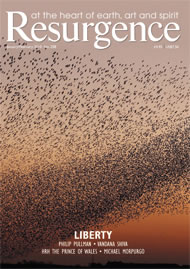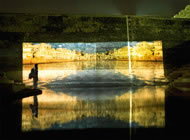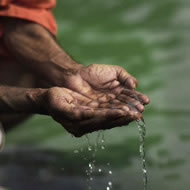Whilst visiting Rajasthan in 2007, I was lucky enough to attend a concert given by The Holiwater Project. The event took place in an abandoned stone ‘water tank’, one of the traditional reservoirs in India that once provided drinking water to the surrounding towns and villages. Sadly, this one was derelict, the remaining few feet of water at the bottom fetid and polluted. Yet, as the audience settled onto the stone steps and dusk descended, votive lamps were lit and floated out upon the water, the very act of which transformed the arena into a sacred space. Then, the tank was filled with an evocative fusion of traditional and contemporary Indian music, and a film about that most ubiquitous and least valued element – water – began. And the whole scene was watched over by a solitary stork-billed kingfisher, a reminder that we are in danger of losing not just India’s sacred rivers, but the biodiversity that depends upon them.
The Holiwater Project is a collective of artists, musicians and ecologists who gather together to perform in protest at the ailing condition of the Ganges river in particular and all rivers in general. They aim to raise awareness of the grave threats to India’s watercourses from over-extraction, pollution, industrial and agricultural practices and the needs of India’s burgeoning population. But the project is also a call to action: their goal is to inspire individuals and groups from all over the world to connect and act – now – to stop the world’s water crisis turning into a catastrophe. Founder Andrei Jewell says, “The Holiwater Project is gathering momentum and has become a living, breathing point of connection, a vital hub, for every one who demands change in the way we manage our water and our world.”
The Holiwater Project is particularly inspired by direct experience of the sacred Ganges river – its rhythms, its beauty, its people, its meaning for humanity and, sadly, its rapid deterioration in the face of neglect and misunderstanding. “Scarce and desecrated water resources the world over have become a 21st-century global crisis – for the Earth, its ecosystems and its citizens,” says Jewell. “The ailing Ganges represents a wake-up call for our times – and The Holiwater Project aims to give a voice to the Ganges and her plight, for her plight reflects so vividly that of the Earth’s dwindling rivers.”
The Project’s forthcoming Holiwater feature-length documentary is a film inspired by the Baul musical tradition, threading the music with the philosophy and vision of leading Indian thinkers and environmentalists who consider ‘consciousness’ as a source of spiritual and scientific wisdom. The film celebrates true consciousness as a state of harmony with Nature, where we are all interconnected. Water thus becomes a powerful metaphor to illustrate our connection to each other and the Earth. In the words of Anupam Mishra from the Gandhi Peace Foundation, “Whatever is connected to water is itself holy, because water gives life.”
Water is a life-giver, yet we continue to abuse and debase it. The Holiwater Project aims to remind us that what we do to water, we ultimately do to ourselves. The parlous state of our rivers worldwide is a reflection of humanity’s state of consciousness.
The rivers are calling us for help – will you answer?








